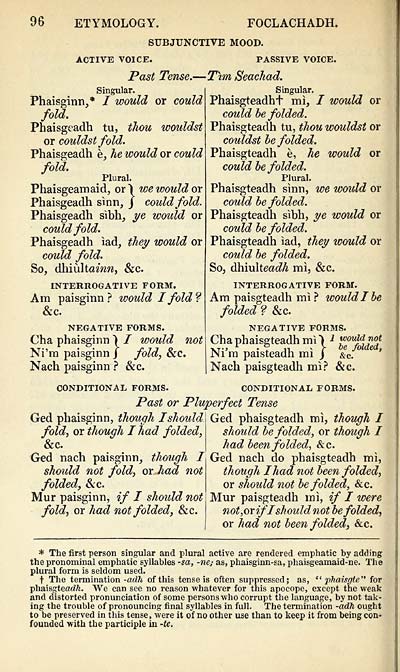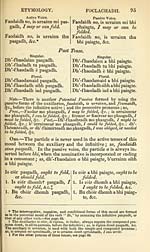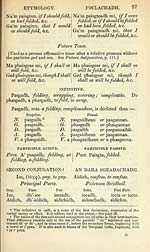Books and other items printed in Gaelic from 1841 to 1870 > Stéidhean a' Ghràmair Ghaëlig
(124) Page 96
Download files
Complete book:
Individual page:
Thumbnail gallery: Grid view | List view

96 ETYMOLOGY.
FOCLACHADH.
SUBJUNCTIVE MOOD.
ACTIVE VOICE.
Past Tense. —
Singular.
Phaisginn,* / would or could
fold.
Phaisgeadh tu, thou wouldst
or couldst fold.
Phaisgeadh è, he would or could
fold.
Plural.
Phaisgeamaid, or ì we would or
Phaisgeadh sìnn, J couldfold.
Phaisgeadh sìbh, ye would or
couldfold.
Phaisgeadh ìad, they would or
could fold.
So, dhiùlta«Vm, &c.
INTERROGATIVE FORM.
Am paisginn ? would I fold ?
&c.
NEGATIVE FORMS.
Cha phaisginn ì / would not
Ni'm paisginn J fold, &c.
Nach paisginn ? &c.
PASSIVE VOICE.
T\m Seachad.
Singular.
Phaisgteadht mì, / would or
could befolded.
Phaisgteadh tu, thou wouldst or
couldst befolded.
Phaisgteadh è, he would or
could befolded.
Piural.
Phaisgteadh sìnn, we would or
could be folded.
Phaisgteadh sìbh, ye would or
could be folded.
Phaisgteadh ìad, they would or
could be folded.
So, à\\i\x\\.eadh mì, &c.
INTERROGATIVE FORM.
Am paisgteadh mì ? wouldlbe
folded ? &c.
NEGATIVE FORMS.
Chaphaisgteadh mì\ 1 £ m Jf l( g$
Ni'm paisteadh mì J & c . ° 6 '
Nach paisgteadh mì? &c.
CONDITIONAL FORMS. CONDITIONAL FORMS.
Past or Pluperfect Tense
Ged phaisginn, though Ishould Ged phaisgteadh mì, though I
fold, or though I had folded, should be folded, or though I
&c. had beenfolded, &c.
Ged nach paisginn, though I Ged nach do phaisgteadh mì,
should not fold, or had not
folded, &c.
Mur paisginn, if I should not
fold, or had notfolded, &c.
though Ihad not been folded,
or should not be folded, &c.
Mur paisgteadh mì, if I were
not,orif!should not befolded,
or had not been folded, &c.
* The first person singular and plural active are rendered emphatic by adding
the pronominal emphatic syllables -sa, -nej as, phaisginn-sa, phaisgeamaid-ne. The
plural form is seldom used.
t The termination -adh of this tense is often suppressed; as, " phaisgte" for
phaisgteatfft. We can see no reason whatever for this apocope, except the weak
and distorted pronunciation of some persons who corrupt the language, by not tak-
ing the trouble of pronouncing final syllables in full. The termination -adìi ought
to be preserved in this tense, were it of no other use than to keep it from being con-
founded with the participle in -te.
FOCLACHADH.
SUBJUNCTIVE MOOD.
ACTIVE VOICE.
Past Tense. —
Singular.
Phaisginn,* / would or could
fold.
Phaisgeadh tu, thou wouldst
or couldst fold.
Phaisgeadh è, he would or could
fold.
Plural.
Phaisgeamaid, or ì we would or
Phaisgeadh sìnn, J couldfold.
Phaisgeadh sìbh, ye would or
couldfold.
Phaisgeadh ìad, they would or
could fold.
So, dhiùlta«Vm, &c.
INTERROGATIVE FORM.
Am paisginn ? would I fold ?
&c.
NEGATIVE FORMS.
Cha phaisginn ì / would not
Ni'm paisginn J fold, &c.
Nach paisginn ? &c.
PASSIVE VOICE.
T\m Seachad.
Singular.
Phaisgteadht mì, / would or
could befolded.
Phaisgteadh tu, thou wouldst or
couldst befolded.
Phaisgteadh è, he would or
could befolded.
Piural.
Phaisgteadh sìnn, we would or
could be folded.
Phaisgteadh sìbh, ye would or
could be folded.
Phaisgteadh ìad, they would or
could be folded.
So, à\\i\x\\.eadh mì, &c.
INTERROGATIVE FORM.
Am paisgteadh mì ? wouldlbe
folded ? &c.
NEGATIVE FORMS.
Chaphaisgteadh mì\ 1 £ m Jf l( g$
Ni'm paisteadh mì J & c . ° 6 '
Nach paisgteadh mì? &c.
CONDITIONAL FORMS. CONDITIONAL FORMS.
Past or Pluperfect Tense
Ged phaisginn, though Ishould Ged phaisgteadh mì, though I
fold, or though I had folded, should be folded, or though I
&c. had beenfolded, &c.
Ged nach paisginn, though I Ged nach do phaisgteadh mì,
should not fold, or had not
folded, &c.
Mur paisginn, if I should not
fold, or had notfolded, &c.
though Ihad not been folded,
or should not be folded, &c.
Mur paisgteadh mì, if I were
not,orif!should not befolded,
or had not been folded, &c.
* The first person singular and plural active are rendered emphatic by adding
the pronominal emphatic syllables -sa, -nej as, phaisginn-sa, phaisgeamaid-ne. The
plural form is seldom used.
t The termination -adh of this tense is often suppressed; as, " phaisgte" for
phaisgteatfft. We can see no reason whatever for this apocope, except the weak
and distorted pronunciation of some persons who corrupt the language, by not tak-
ing the trouble of pronouncing final syllables in full. The termination -adìi ought
to be preserved in this tense, were it of no other use than to keep it from being con-
founded with the participle in -te.
Set display mode to:
![]() Universal Viewer |
Universal Viewer | ![]() Mirador |
Large image | Transcription
Mirador |
Large image | Transcription
Images and transcriptions on this page, including medium image downloads, may be used under the Creative Commons Attribution 4.0 International Licence unless otherwise stated. ![]()
| Rare items in Gaelic > Books and other items printed in Gaelic from 1841 to 1870 > Stéidhean a' Ghràmair Ghaëlig > (124) Page 96 |
|---|
| Permanent URL | https://digital.nls.uk/101713087 |
|---|
| Description | Out-of-copyright books printed in Gaelic between 1631 and 1900. Also some pamphlets and chapbooks. Includes poetry and songs, religious books such as catechisms and hymns, and different editions of the Bible and the Psalms. Also includes the second book ever published in Gaelic in 1631. |
|---|

